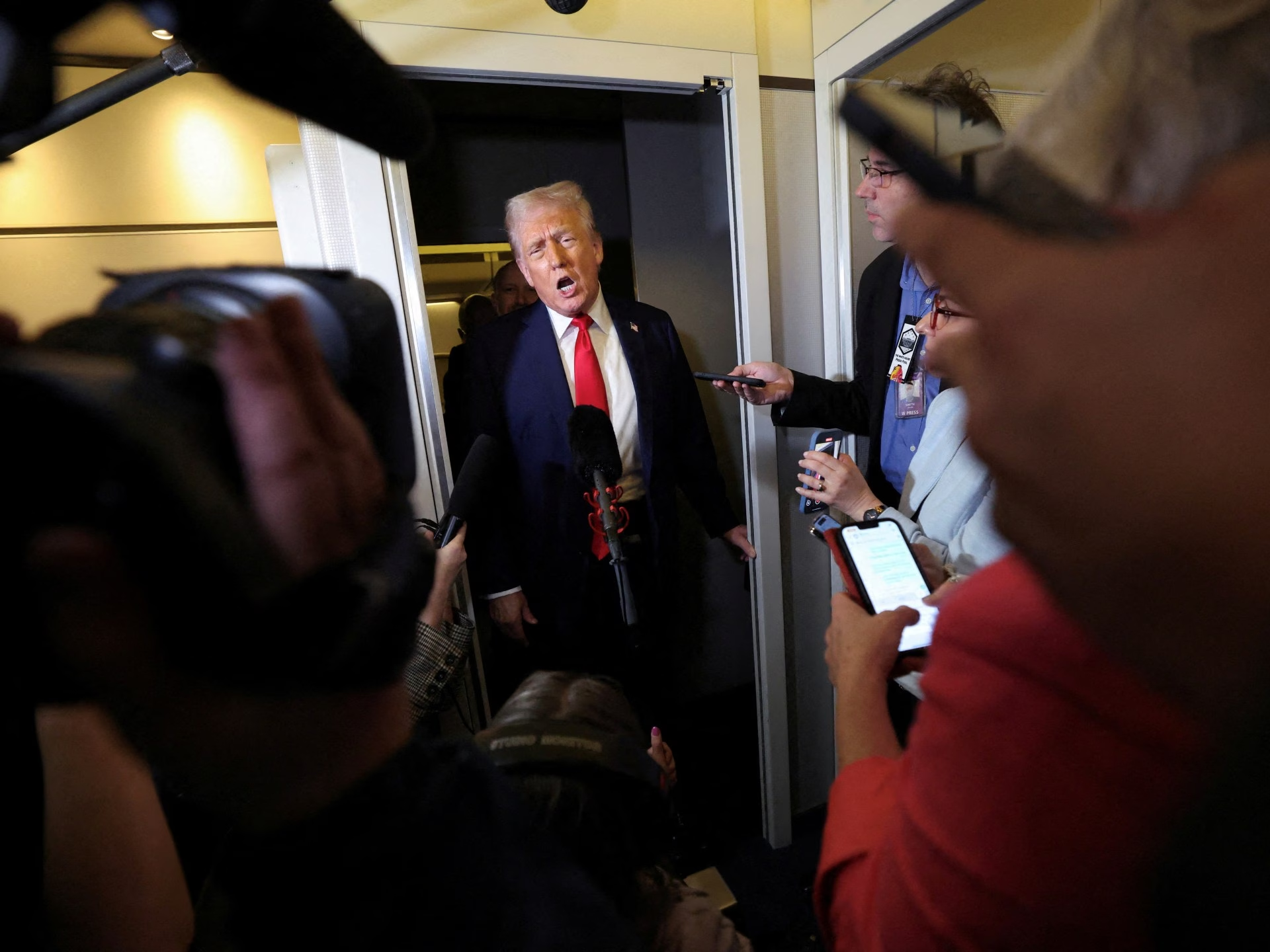Pres%; remarks dampen hopes that tariffs would only target certain countries.
United States President Donald Trump has stated that his soon-to-be-announced reciprocal tariffs will apply to “all countries”, deflating hopes that only economies with the largest trade imbalances with the US would be targeted.
Speaking to reporters on board Air Force One on Sunday, Trump mentioned that his long-awaited tariff announcement on April 2 will “start” with all countries.
You’d start with all countries,” Trump said to reporters. “Essentially, all of the countries that we’re talking about.”
Trump’s remarks come after his administration had minimized the scope of the tariffs set to be unveiled on April 2, which the US president has referred to as “liberation day”.
White House economics adviser Kevin Hassett earlier this month suggested that the measures would primarily target 10 to 15 countries responsible for the majority of the US trade deficit.
“There are more than 100 countries that don’t really have any tariffs on us and don’t have any non-tariff barriers,” Hassett mentioned in an interview with Fox Business.
Trump himself also seemed to understate the severity of the impending tariffs last week, saying the reciprocal measures would be “very lenient” and that people would be “surprised”.
Although the specific details of Trump’s plans are unclear, his administration has pledged to impose duties on countries equal to the tariffs and non-tariff trade barriers, such as subsidies, that those countries impose on US exports.
Trump, who recently announced a 25 percent tariff on all auto imports, has constantly accused other countries of taking advantage of the US in trade, framing his protectionist economic agenda as necessary to revive domestic manufacturing and create jobs.
Trump’s latest tariffs on cars and other vehicles have strained Washington’s relations with some of its closest partners and allies, including Canada, the European Union, and Japan, all of which have significant automotive industries.
Trump’s flip-flopping announcements on tariffs have also sent ripples through global markets, with investors struggling to decipher whether the US president intends to make his tariffs permanent or views them primarily as a bargaining tool.
Trump last week mentioned being “certainly open” to making deals with countries to avoid the tariffs after the April 2 announcement.
Asian stock markets plummeted on Monday in anticipation of further disruption to global trade.
Japan’s benchmark Nikkei 225 and South Korea’s benchmark KOSPI fell by 3.85 percent and 2.55 percent, respectively, as of 03:00 GMT.
Australia’s ASX 200 declined by 1.56 percent, while Hong Kong’s Hang Seng was down 1.20 percent.
Gold, a classic safe-haven asset during periods of market turbulence, soared above $3,100 for the first time, trading at a record high of $3,106.79 per ounce.
Speaking to reporters on board Air Force One on Sunday, Trump mentioned that his long-awaited tariff announcement on April 2 will “start” with all countries.
You’d start with all countries,” Trump said to reporters. “Essentially, all of the countries that we’re talking about.”
Trump’s remarks come after his administration had minimized the scope of the tariffs set to be unveiled on April 2, which the US president has referred to as “liberation day”.
White House economics adviser Kevin Hassett earlier this month suggested that the measures would primarily target 10 to 15 countries responsible for the majority of the US trade deficit.
“There are more than 100 countries that don’t really have any tariffs on us and don’t have any non-tariff barriers,” Hassett mentioned in an interview with Fox Business.
Trump himself also seemed to understate the severity of the impending tariffs last week, saying the reciprocal measures would be “very lenient” and that people would be “surprised”.
Although the specific details of Trump’s plans are unclear, his administration has pledged to impose duties on countries equal to the tariffs and non-tariff trade barriers, such as subsidies, that those countries impose on US exports.
Trump, who recently announced a 25 percent tariff on all auto imports, has constantly accused other countries of taking advantage of the US in trade, framing his protectionist economic agenda as necessary to revive domestic manufacturing and create jobs.
Trump’s latest tariffs on cars and other vehicles have strained Washington’s relations with some of its closest partners and allies, including Canada, the European Union, and Japan, all of which have significant automotive industries.
Trump’s flip-flopping announcements on tariffs have also sent ripples through global markets, with investors struggling to decipher whether the US president intends to make his tariffs permanent or views them primarily as a bargaining tool.
Trump last week mentioned being “certainly open” to making deals with countries to avoid the tariffs after the April 2 announcement.
Asian stock markets plummeted on Monday in anticipation of further disruption to global trade.
Japan’s benchmark Nikkei 225 and South Korea’s benchmark KOSPI fell by 3.85 percent and 2.55 percent, respectively, as of 03:00 GMT.
Australia’s ASX 200 declined by 1.56 percent, while Hong Kong’s Hang Seng was down 1.20 percent.
Gold, a classic safe-haven asset during periods of market turbulence, soared above $3,100 for the first time, trading at a record high of $3,106.79 per ounce.







